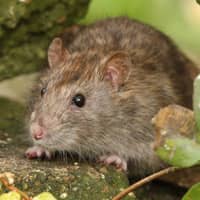
Rats
Rats are commensal rodents. That means they “share” the table with humans and partially rely on us for survival. The relationship between rats and people is one-sided with rats being the only ones benefiting from it. Not only do rats invade our homes and businesses, contaminating our food and destroying insulation and other building materials with their droppings and urine, they also ruin our personal belongings and have the ability to introduce serious health issues. If you see a rat in your structure, contact American Pest Solutions right away. Chances are where there is one rat there are more and you don’t want these critters running unchecked in your home or business.
The Trouble With Rats
Rats and other rodents have front teeth that continuously grow. In order to keep them at a manageable length, they are always chewing on something. Unfortunately inside a house or commercial facility, this can include chewing on electric wires (which increases the risk of fire), drywall, insulation, structural beams, furniture, and cardboard boxes. The list is endless really. As mentioned handiwork by rats can lead to house fires but can also create water and mold issues.
Norway Rat Or Roof Rat: Which Species?
You might think a rat is a rat is a rat, but that is simply not the case. The Norway rat and the roof rat are two types of rats that often invade structures in search of food, water, and shelter. Though they are both rat species, there are some subtle physical differences and habitat preferences that help to tell them apart.
-
Norway Rat - Norway rats are the larger species and tend to live in more urban areas. They are not strong climbers so they prefer to live on the bottom floors and in basements. Norway rats are brownish-gray in color and including their tail are about 10-12 inches in length. The Norway rat’s tail is shorter than its body.
-
Roof Rat - The roof rat is the smaller of the two and prefers moist, warm areas. They are actually good climbers that live in higher areas of homes and facilities. They are shiny black in color with a lighter underbelly, and including their tail are about 6-8 inches in length. The roof rat’s tail is longer than its body.
Diseases Spread By Rats
Along with destroying property and structures located in your home, rats may also carry and transmit a variety of serious diseases including murine typhus, leptospirosis, and salmonellosis, which is the cause of food poisoning. Also, when rats enter, they are most likely not the only pest entering uninvited. Rats often introduce parasites such as fleas, mites, and ticks.
How To Keep Rats Out
Rats are bad news and precautions should be taken to prevent these pests from entering your home or business. To keep rats out you should:
-
Seal cracks, crevices, and gaps on the outside of the structure, from the foundation to the roofline.
-
Trim trees and bushes back so that they do not touch the exterior.
-
Keep clutter to a minimum especially in storage areas.
-
Limit any access to food or water in your home by fixing leaky pipes or fixtures, and by keeping food in sealed containers, or in the refrigerator instead of out on your counters.
Seek Help At The First Sign Of A Rat Problem
If you’ve detected rats in your home, contact us today. Our pest control technicians are state-licensed and have the tools, knowledge, and experience to resolve your rat problem. Click here to learn more about our rodent control program or simply contact us to discuss your situation.
Helpful Rat Articles
How Norway Rats And Roof Rats Get Into New England Homes
Common Signs Of Rat Infestation In New England Homes
Mice Or Rats; Which Is Worse To Have In My New England Home?
What Everyone In Western Massachusetts Should Know About Rats
The Problem With DIY Rodent Control In Western Massachusetts
Why Rodents Are A Year-Round Problem In New England
Why Call A Pest Control Professional For Rodent Problems
Why Springfield Residents Need Year-Round Pest Control
Are You Accidentally Drawing Rodents To Your Western Massachusetts Home?
Rodent Exclusion In Western Massachusetts: What You Should Know
Simple Ways To Deter The Rats Living In Western Massachusetts
Are Rodents Causing You Strife In Western Massachusetts?
What To Do About Pesky Rodents In Western Massachusetts
For Immediate Assistance Call (888) 324-7025





